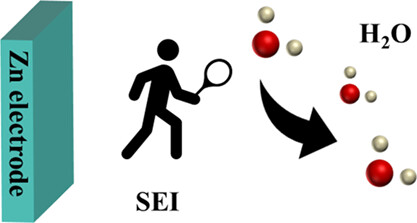C.P. Li, J. Zhang, K. Zhang, A.P. Zhang, W. Jian*, P. Jiang*, Z.-S. Wu, D.B. Ruan
ACS Sustainable Chemistry & Engineering, 2023, 11.
DOI: 10.1021/acssuschemeng.3c04872 [PDF]

Aqueous Na–Zn ion batteries are promising for large-scale energy storage due to their low cost and high output voltage potential. However, the formed dendrites and notorious side reactions of zinc anodes lead to rapid performance degradation. Here, a sodium–zinc dication hybrid hydrated deep eutectic electrolyte system (NZDES) is proposed, in which organic ligands and all water molecules participate in NZDES’s internal solvation structure networks, resulting in the suppressed side reaction at the Zn anode. Furthermore, the unique aqueous Zn2+ solvation shell is efficiently regulated by Na+, enabling high Zn deposition/stripping reversibility (96.5% Coulombic efficiency). Meanwhile, the decomposition of solvated methylsulfonylmethane (MSM) forms the enhanced solid electrolyte interphase, which improves the smoothness of the Zn anode and further suppresses the decomposition of water. With these merits, the CuHCF/Zn hybrid batteries with dication deep eutectic electrolytes exhibit a high capacity retention of >91.6% after 3000 cycles at 10 C with a 1.9 V open circuit voltage. The results provide a potential design strategy for an effective solid electrolyte interface for aqueous zinc ion batteries.